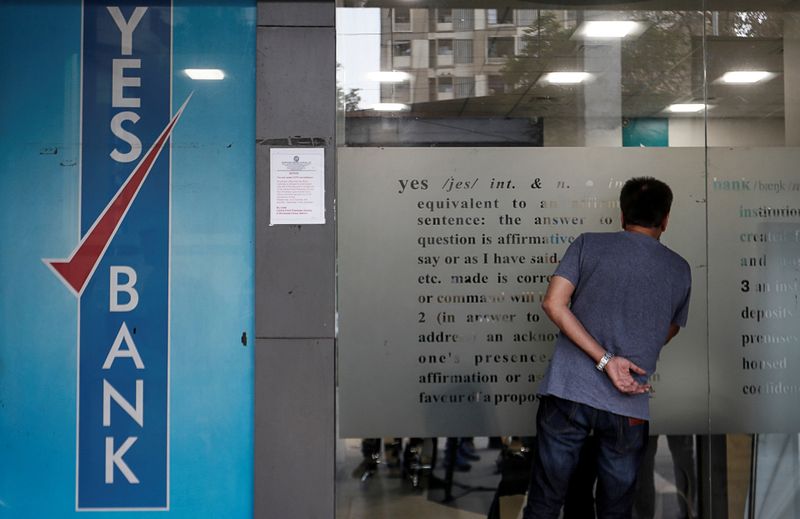By Abhirup Roy and Sumeet Chatterjee
MUMBAI/HONG KONG (Reuters) - The unexpected writedown of some bonds issued by crisis-hit Indian lender Yes Bank Ltd (NS:YESB) as part of a state-led rescue is set to raise borrowing costs and make capital-raising tougher for other banks, investors and analysts said.
The take over of Yes Bank by India's central bank last week comes against the backdrop of a string of scandals in the country's financial sector in the last couple of years - from a $2 billion fraud at a large state-owned bank to mismanagement of funds at shadow banks.
The Reserve Bank of India (RBI) said it would work on a revival plan, as part of which bonds classified as Additional Tier 1 (AT1) capital will be written down "permanently, in full."
So-called AT1 bonds were introduced after the 2008 global financial crisis. They carry higher interest rates than more senior debt as investors accept the risk they can lose their investment at certain pre-agreed points if the funds are needed to bolster a struggling bank's capital.
Yes Bank had about 88 billion rupees ($1.2 billion) in AT1 capital as of March 2019, its annual report showed, under the Basel III framework. Investors included Nippon India Mutual Fund, Franklin Templeton, a slew of local fund houses and retail investors.
"What this incident does is penalize the good names too," said a fund manager, who holds Yes Bank AT1 bonds, adding some investors are now considering a legal challenge against the central bank's plan to wipe them out.
"You're in effect creating an environment where the liquidity dries up on AT1s. Only risk-hungry funds will be buying AT1 bonds now," said the fund manager, who declined to be named as he was not authorized to speak to the media.
"A minimum 50-100 basis point rise in AT1 borrowing costs could happen."
Nippon India and Franklin Templeton did not immediately provide comment to Reuters' queries.
Underscoring the challenges, mid-sized IndusInd Bank Ltd (NS:INBK) said on Saturday it was deferring its Monday board meeting to consider raising capital via debt issuance, including AT1 bonds.
IndusInd added it was adequately capitalized and the decision to defer was due to current market conditions.
"It's not that investors will altogether ignore BFSI as a sector," said Siddharth Purohit, research analyst at Mumbai-based SMC Institutional Equities, referring to the banking, financial services and insurance sectors.
"The large ones, who have the ability to absorb any shock and those who have a time tested model, will be in a position to raise money and keep on expanding their book."
Government-owned State Bank of India (NS:SBI), the country's biggest lender, said on Saturday it would invest funds to buy a 49% stake in Yes Bank as part of the initial phase of a rescue deal.
While the bonds are designed to help a bank through a crisis, investors warned the fallout for other banks could be substantial.
Boutique rating agency Acuité Ratings warned in a note that the RBI's plan to wipe out AT1 holders would "substantially add to the risk perception on these hybrid instruments and limit their issuances."
"A resilient economy can digest these things very quickly and move on. The biggest concern is these things are happening when the economy has slowed down sharply," said the head of an Indian fund that manages more than $10 billion in assets.

The fund manager, who declined to be named as he was not authorized to speak to the media, added he has been paring his portfolio holdings of Indian bank shares due to economic headwinds.